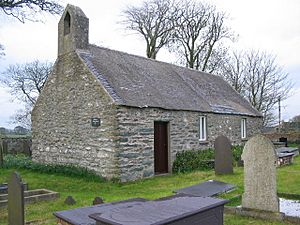St Figael's Church, Llanfigael facts for kids
Quick facts for kids St Figael's Church, Llanfigael |
|
|---|---|

St Figael's Church, Llanfigael, from the southwest
|
|
| Lua error in Module:Location_map at line 420: attempt to index field 'wikibase' (a nil value). | |
| OS grid reference | SH 327 828 |
| Location | Llanfigael, Anglesey |
| Country | Wales |
| Denomination | Church in Wales |
| Website | Friends of Friendless Churches |
| History | |
| Status | Parish church |
| Founded | Before 1254 |
| Dedication | Saint Figael |
| Architecture | |
| Functional status | Redundant |
| Heritage designation | Grade II |
| Designated | 5 April 1971 |
| Architectural type | Church |
| Specifications | |
| Materials | Stone |
St Figael's Church is an old church building in a small village called Llanfigael, located in Anglesey, Wales. It is no longer used for regular church services. This special building is protected as a Grade II listed building by Cadw, which means it is important for its history and design. The church is now looked after by a group called the Friends of Friendless Churches. It is known for still having most of its original inside look from the early 1800s.
History of St Figael's Church
The church building you see today was mostly built in the 1700s. It was then greatly rebuilt in 1841. People know there has been a church on this spot since at least 1254. Some parts of the very old church, like its foundations and parts of its walls, might still be there.
Since the church stopped being used for regular services, a charity called the Friends of Friendless Churches took over its care. They received a very long lease for the church on February 1, 2007. After taking charge, this group worked to fix the church. They put a new roof on the building. They also put in new wooden windows. These new windows were designed to look just like the old ones.
Architecture and Design
St Figael's Church is a small, rectangular building. It is made from stone pieces that were not shaped perfectly, called rubble. At the west end of the church, there is a pointed roof section called a gable. This gable has a smooth, plastered surface and holds a small bell tower, known as a bellcote.
The main entrance door is on the south side, at the west end. This church does not have a separate chancel, which is usually the part of a church near the altar. The inside parts of the church, like the furniture, are believed to be from the 1800s. The pulpit, where sermons are given, is on the north side. The church also has box pews, which are like enclosed seating areas, and regular benches.
At the west end of the church, there are three baptismal fonts. A font is a basin used for baptisms. The oldest font is from the 1100s. It used to be in another church called St Ynghenedl. The second font is from the 1300s and has eight sides. The third font is quite rare; it looks like a cupboard.
 | Calvin Brent |
 | Walter T. Bailey |
 | Martha Cassell Thompson |
 | Alberta Jeannette Cassell |

